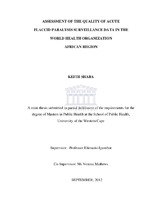| dc.contributor.advisor | Igumbor, Ehimario | |
| dc.contributor.advisor | Mathews, Verona | |
| dc.contributor.author | Shaba, Keith | |
| dc.date.accessioned | 2015-11-03T22:16:36Z | |
| dc.date.available | 2015-11-03T22:16:36Z | |
| dc.date.issued | 2012 | |
| dc.identifier.uri | http://hdl.handle.net/11394/4629 | |
| dc.description | Magister Public Health - MPH | en_US |
| dc.description.abstract | Poliomyelitis (polio) is an infectious disease of high public health importance. In 1988, the World Health Organization (WHO) set the goal of polio eradication worldwide through the Global Polio Eradication Initiative (GPEI). A threeyear period of zero indigenous wild poliovirus in all countries, in the presence of highquality acute flaccid paralysis (AFP) surveillance, is the basis of an independent commission’s determination of when a WHO region or a country can be certified as polio free. AFP surveillance being one of the critical elements in polio eradication campaign, aims to report and investigate all cases of acute flaccid paralysis occurring in children aged less than 15 years using clinical, epidemiological and laboratory methods. The information collected is cleaned and entered, into a database and maintained in EPI Info format at the WHO country office of each of the 46 countries, the three sub regional offices or Inter country Support Teams (IST) offices and the WHO African Regional Office. In addition, data from sixteen polio laboratories in various African countries maintain records of the laboratory findings and results of confirmed polio cases. The quality of data generated through AFP surveillance and maintained in the African regional data base has not been critically and systematically reviewed and documented. This study therefore was designed to gather information and document the quality of AFP data base, a key component of the global polio eradication effort. A cross-sectional descriptive study involving the retrospective review of clinical and laboratory databases of AFP surveillance over a five year period (2004 - 2008) was designed. In this study, databases of CIFs containing clinical and laboratory data from AFP cases reported from all 46 countries of the WHO African Region comprising of 57,619 clinical and 59,843 laboratory records were critically reviewed. | en_US |
| dc.language.iso | en | en_US |
| dc.publisher | University of the Western Cape | en_US |
| dc.subject | Data quality | en_US |
| dc.subject | Clinical and laboratory databases | en_US |
| dc.subject | Acute flaccid paralysis surveillance | en_US |
| dc.subject | Global polio eradication Initiative | en_US |
| dc.title | Assessment of the quality of acute flaccid paralysis surveillance data in the World Health Organization African Region | en_US |
| dc.rights.holder | University of the Western Cape | en_US |

